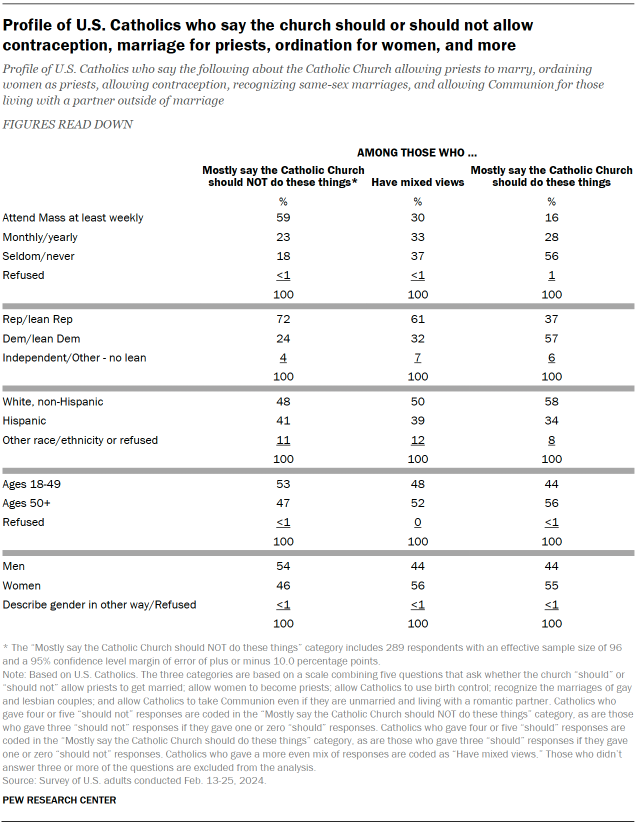But his ratings have dipped since 2021 and become politically polarized over the past decade
A new Pew Research Center survey finds that 75% of U.S. Catholics view Pope Francis favorably, down 8 percentage points since we last asked this question in 2021 and 15 points below his peak favorability rating, which was 90% in early 2015.
Since becoming pope in 2013, Francis often has received favorable ratings from 80% or more of U.S. Catholics. He generally has been viewed more positively than his immediate predecessor, Pope Benedict XVI, but less positively than Benedict’s predecessor, Pope John Paul II.
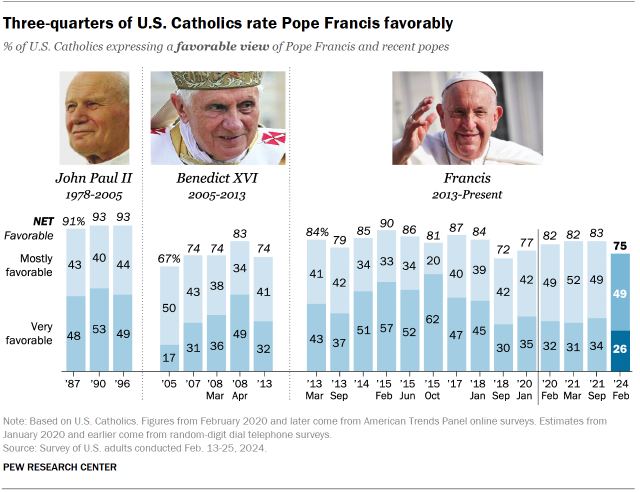
(Benedict’s favorability ratings varied between 67% and 83% during his pontificate. Upward of 90% of U.S. Catholics expressed favorable views of John Paul II on the three occasions that the Center asked about him in polls between 1987 and 1996.)
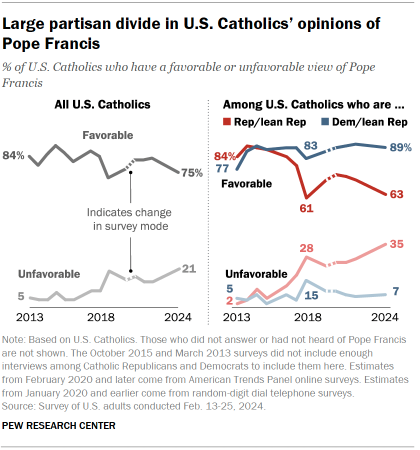
The partisan gap in views of Pope Francis is now as large as it’s ever been in our surveys. Roughly nine-in-ten Catholics who are Democrats or lean toward the Democratic Party hold a positive view of him, compared with 63% of Catholics who are Republicans or lean Republican.
Regardless of their partisan leanings, most U.S. Catholics regard Francis as an agent of change. Overall, about seven-in-ten say the current pope represents a change in direction for the church, including 42% who say he represents a major change.

Many U.S. Catholics would welcome more change. For example, the survey finds that:
- 83% of U.S. Catholics want the church to allow the use of contraception.
- 75% say the church should allow Catholics to take Communion even if they are unmarried and living with a romantic partner.
- 69% say priests should be allowed to get married.
- 64% say women should be allowed to become priests.
- 54% say the church should recognize the marriages of gay and lesbian couples.
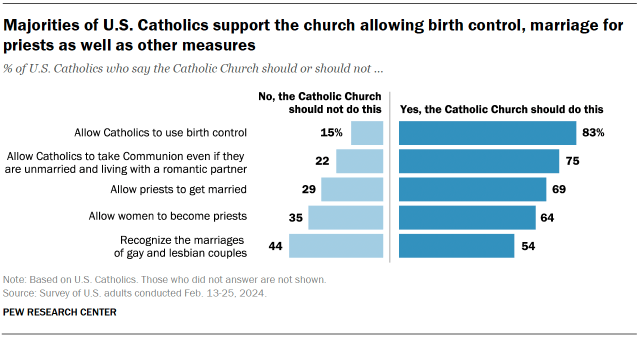
But there are also many Catholics who say the church should not take these steps. A new analysis in this report compares U.S. Catholics who favor these changes with those who oppose them. It shows that:
- The Catholics who mostly favor a variety of changes are largely Democrats or lean Democratic (57%), and many say they seldom or never attend Mass (56%).
- The Catholics who mostly say the church should not take these steps are predominantly Republicans or lean Republican (72%), and many say they attend Mass at least once a week (59%).
These are among the key findings of a Pew Research Center survey conducted Feb. 13-25, 2024, among a nationally representative sample of 12,693 respondents, including 2,019 Catholic adults.
Click below to read more information about:
Catholics’ views of Pope Francis
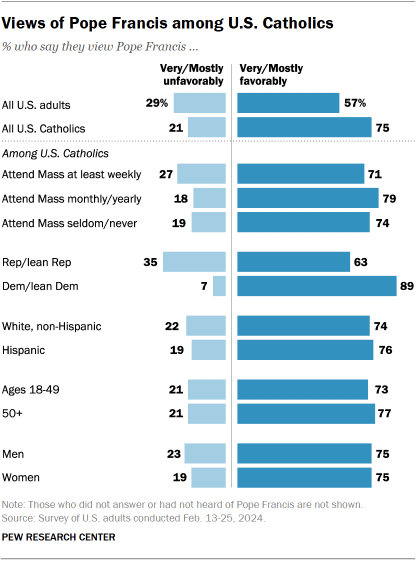
The 75% favorability rating for Pope Francis by U.S. Catholics represents a decrease of 8 points from the last time we asked this question, in September 2021. Then, 83% said they viewed him mostly or very favorably.
The overall drop in favorability reflects growing dissatisfaction with the current pope among Catholics who identify as Republicans or independents who lean toward the Republican Party. Fully 35% of Catholic Republicans and Republican leaners now say they have an unfavorable view of Pope Francis, compared with just 7% of Catholic Democrats and Democratic leaners.
This survey marks the first time that more than 28% of Catholic Republicans have expressed unfavorable views of Francis in roughly a dozen times we have asked this question since his papacy began in 2013.
While Catholic Republicans have grown more negative toward Pope Francis, the views of Catholic Democrats have barely budged over the last decade. The 89% of Catholic Democrats who now express a favorable view of the pontiff is virtually identical to the 87% who said this in our February 2014 survey.
Catholics’ views on this question vary little by race, gender, age or Mass attendance.
Perceptions of Pope Francis as a source of change

As previously noted, about seven-in-ten Catholics see Pope Francis as representing either a major (42%) or minor (30%) change in the direction of the church.
The view that Francis represents a big change for the church is especially pronounced among Catholics who view him unfavorably.
Among those with an unfavorable view of the pope, 54% say he represents a major change in direction for the church, while 20% say he represents a minor change.
Those who view Francis favorably are less likely than those with unfavorable views to see him as a major change (41%), and more likely to say he represents a minor change (35%).
Views about the priesthood, contraception, sexuality
Big differences between Mass-attending Catholics and those who don’t go
Catholics who attend Mass regularly (once a week or more) are far more inclined than those who go less often to say the church should take a traditional or conservative approach on questions about the priesthood and sexuality.
For instance, 65% of weekly Mass attenders say the church should not recognize the marriages of same-sex couples. And 56% say the church should not allow women to become priests.
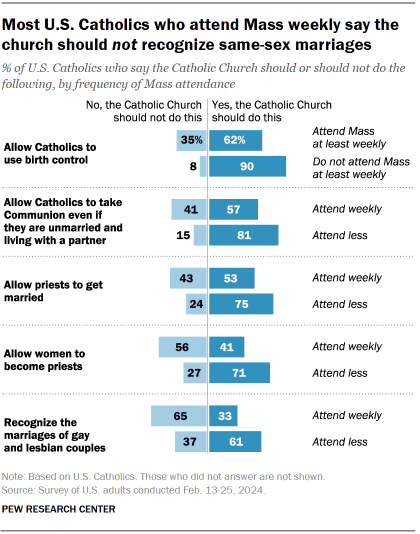
By comparison, most Catholics who don’t attend Mass weekly say the church should recognize the marriages of same-sex couples (61%) and ordain women priests (71%).
There are similar differences in opinion on the survey’s questions about contraception, allowing priests to marry, and allowing Communion for Catholics living with a romantic partner outside of marriage. However, on all three questions, half of Catholics or more in both groups – those who attend regularly and those who don’t – say the church should take these steps.
The survey also shows that Catholic Democrats are more likely than Catholic Republicans to say they want the church to allow married priests, women priests, contraception, same-sex marriages and access to Communion for those living with a partner outside of marriage.
Older Catholics, White Catholics and Catholic women tend to be a bit more inclined than younger Catholics, Hispanic Catholics and Catholic men to say the church should make these changes, though differences by age, race and ethnicity, and gender are often modest and aren’t seen on every question.
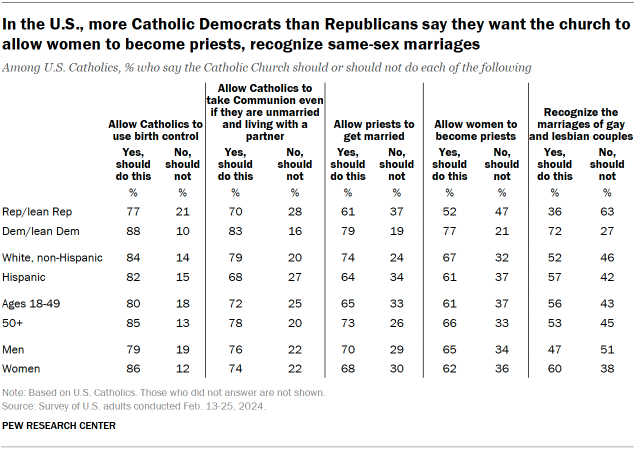
Trends over time
Pew Research Center previously asked these questions (or similar questions) about the Catholic Church’s approach to the priesthood and sexuality in telephone surveys conducted between 2013 and 2015. The switch in survey mode (from telephone to web) means it’s important to use caution when comparing results over time.
Nevertheless, the data suggests there has been an increase over the last decade or so in the share of Catholics who favor allowing unmarried people who are living with a romantic partner to receive Communion. There also appears to be a slight increase in the share of Catholics who say the church should allow birth control.
The shares of Catholics who say the church should allow priests to get married, allow women to become priests and recognize the marriages of gay and lesbian couples are in the same ballpark as they were a decade ago.
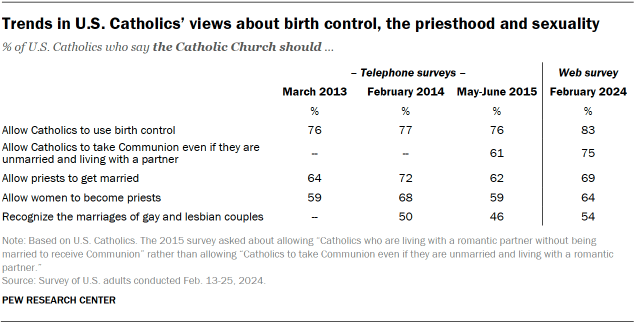
Summing up views about the Catholic Church’s approach to priesthood, sexuality
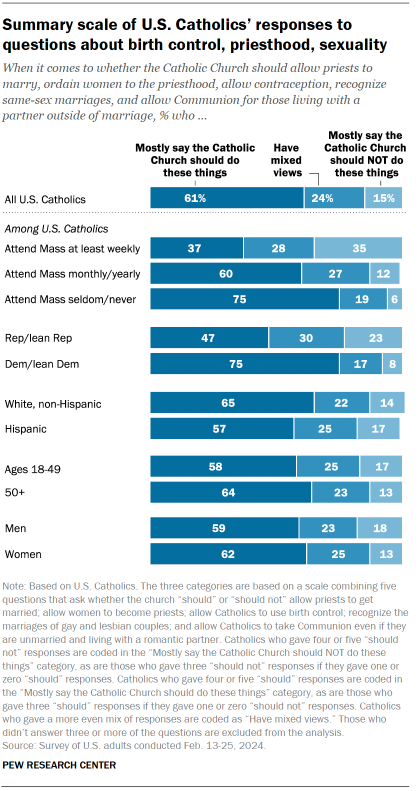
We created a scale to summarize U.S. Catholics’ views about whether the church should or should not do the following things:
- Allow Catholics to use birth control
- Allow Catholics to take Communion even if they are unmarried and living with a romantic partner
- Allow priests to get married
- Allow women to become priests
- Recognize the marriages of gay and lesbian couples
Overall, 61% of Catholics mostly say the church should take these steps, while 15% of Catholics mostly say the church should not. About a quarter express mixed views, saying the church should do some of these things but not others.
Weekly Mass attenders are much more likely than those who go less often to say the church should not do these things. Even among weekly Mass-goers, though, roughly one-third mostly say the church should allow contraception, marriage for priests, women’s ordination to the priesthood, Communion for couples living together outside of marriage, and recognition of same-sex marriages.
Catholic Democrats and Democratic leaners are much more likely than Catholic Republicans and Republican leaners to say the church mostly should bring about these changes. Meanwhile, Catholic Republicans are more likely than Catholic Democrats to say the church mostly should not take these steps.
Profile of Catholics by their views on whether the church should/should not allow contraception, marriage for priests, and more
Another way to analyze these findings is to flip the lens and analyze the data from the other direction – to ask: Who are the Catholics who mostly say the church should not allow contraception, marriage for priests, women’s ordination, Communion for cohabiting couples or recognition of same-sex marriages? And who are the Catholics who mostly say the church should do these things?
Among Catholics who mostly say the church should not do these things:
- 59% say they attend Mass at least once a week.
- 72% identify with or lean toward the Republican Party.
By contrast, among Catholics who mostly say the church should do these things:
- 56% say they seldom or never attend Mass.
- 57% identify with or lean toward the Democratic Party.
The share of White Catholics in the “mostly should not” category is modestly lower (at a 90% confidence level) than the share of White Catholics in the “mostly should” category.
And the share of men in the “mostly should not” category is modestly higher (at a 90% confidence level) than the share of men in the “mostly should” category.
